Climate change
Global news
AFRICA, ALLIANCE OF SMALL ISLAND STATES, ASIA, AZERBAIJAN, CHAN, CLIMATE CHANGE, EUROPEAN, EUROPEAN UNION, INDIA, INTERNATIONAL RELATIONS, JI, JIWOH ABDULAI, NORTH AMERICA, PARIS AGREEMENT, REGIONAL COOPERATION, SIERRA LEONE, SIMON STIELL, TINA STEGE, UN, UNITED STATES
Marcus Li
0 Comments
Developing Nations Reject Insufficient $300 Billion Climate Deal at UN Summit
At the UN climate summit in Baku, a deal requiring developed nations to provide at least $300 billion annually by 2035 for climate-related aid to developing countries was approved. This pledge was met with widespread criticism from poorer nations, who consider it inadequate. Contents of the negotiations reflected the ongoing challenges and disparities in global climate finance, with many countries calling for a significantly higher funding commitment to effectively address climate impacts.
A contentious climate agreement was reached at the recent UN climate summit in Baku, Azerbaijan, with developed nations committing to allocate at least $300 billion annually by 2035 to assist developing countries manage greenhouse gas emissions and prepare for climate-related disasters. However, this figure has been met with strong disapproval from poorer nations, who view it as insufficient in light of the challenges they face from escalating climate impacts. After extensive negotiations, nearly 200 nations approved the deal, but sentiments of dissatisfaction prevailed among representatives of developing countries, particularly India and several African states, who expressed disappointment with the final agreement.
The growing concerns surrounding the adequacy of this financial support reflect longstanding disparities in climate responsibility between developed and developing nations. The negotiations were marked by frustrations and accusations directed at wealthier nations for their limited contributions and lack of commitment. Nations such as India criticized the agreed-upon funding as merely an “optical illusion” and a “paltry sum,” underscoring the urgent need for more substantial support to combat the impacts of climate change. Despite this, UN officials acknowledged the deal’s imperfections and encouraged viewing it as an initial step toward greater financial commitments in the future.
The approved deal raises the previous funding pledge from $100 billion to $300 billion, yet many developing nations had aimed for a minimum of $500 billion annually to effectively tackle their climate challenges. The discussions were tense, culminating in what the UK’s Energy Secretary termed a “critical eleventh hour deal.” Nevertheless, the sentiments of betrayal articulated by developing country representatives linger as they voiced their displeasure and concern over the meager funding commitment amid growing climate threats.
The article discusses the outcomes of the UN climate summit held in Baku, Azerbaijan, where a deal was struck regarding financial commitments from developed nations to aid developing countries in addressing climate change challenges. Despite the initial agreement, significant discontent arose among poorer nations that deemed the financial pledges insufficient in light of the urgent climate crisis. Developments in international climate finance, the historical responsibility for emissions, and the complexities faced by developing countries in negotiating with wealthier nations form the backdrop for the reactions articulated in the article.
In summary, the climate deal approved at the recent UN summit has been heavily criticized by developing nations that find the financial commitment of $300 billion per year by 2035 inadequate to meet their pressing climate adaptation needs. The expressions of disappointment from representatives of these nations highlight the ongoing struggle for equitable climate finance and the challenges posed by existing inequalities. As both developed and developing countries navigate the complexities of climate negotiations, the outcomes of this summit exemplify the need for a more ambitious and actionable approach to addressing the urgent climate crisis.
Original Source: www.france24.com




Post Comment